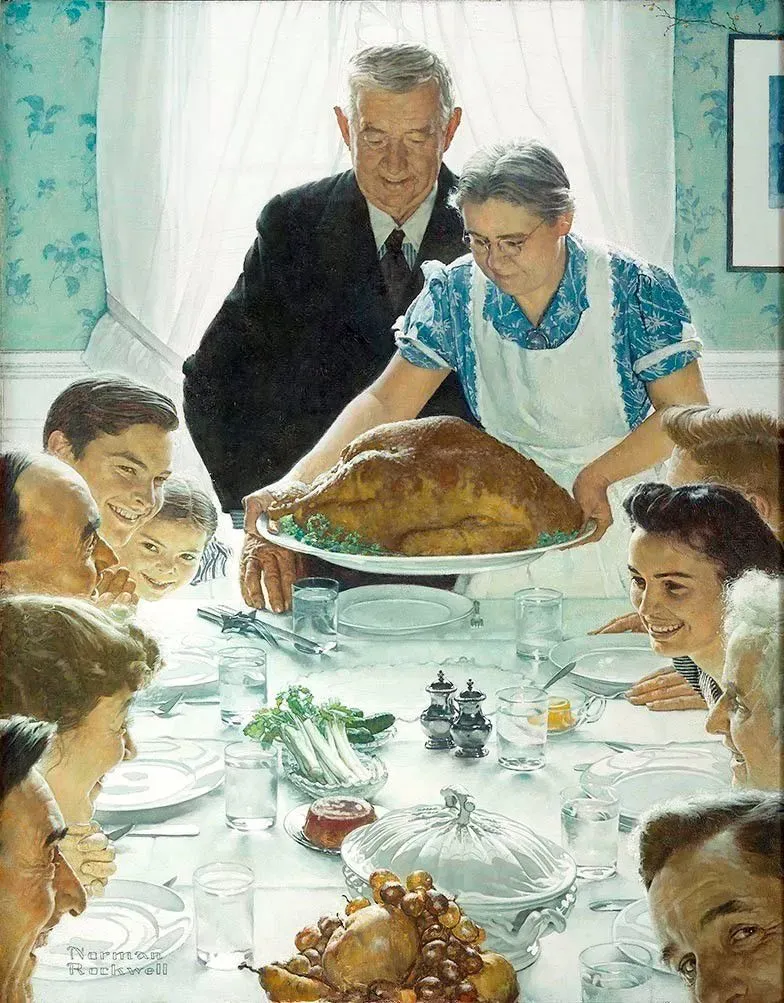The Table Comes First
What does it mean for the table to come first in our homes? In our country?

We're all very familiar with this painting. It was commissioned by the Saturday Evening Post. Did you know the Post would not accept paintings featuring Black people, Indigenous people, Hispanic people or other people of color unless they were portrayed in a position of service? Rockwell worked for the Post for decades. During the last years of his career, Rockwell worked at Look. It was at Look that he finally produced work that was representative of America, including paintings of the civil rights movement and poverty in America. After you've read this essay, scroll back up here and ask yourself, is this a painting of a table that really comes first?
I read The Table Comes First a few years ago. A book about the meaning of food by Adam Gopnik, the title stayed with me far longer than any words that followed it. Gopnik took the title from a conversation he had with chef Fergus Henderson about the steps people take to prepare a new house.
"I don't understand how a young couple can begin life by buying a sofa or television," he told Gopnik. "Don't they know the table comes first?"
It’s a lovely sentiment. The table comes first. The table! A communal object for your household to hold fast while they feast, sometimes on elaborate dishes, sometimes on Wendy’s nuggets. The food we place on the table sustains us and the people who sit around the table sustain us too. If the table comes first, don’t we all?
When we moved into our new home, after thirteen years of sitting around a hand-me-down table, I decided it was time to let the table come first. I spent hours searching for the right one, something that would hold up to hot pots and the clashing of plates and forks. I finally settled on an outdoor table. It’s got a cement top and hardwood legs. Built to withstand wind, rain and snow, it feels just right inside our kitchen. It’s the kind of table that can handle the weight placed upon it by our ever-diversifying family. There’s room at each end for a visitor or two.
The table comes first. When I am sitting around a dinner with my children, when the broccoli didn’t burn, the cups stay upright, when we talk about our day, read a poem, I place my hands upon our table and feel how solid it is. How heavy. How grounding for our home. The table is a sanctuary in our house. You cannot be cast out from our table. There is no missing dinner because of misbehavior. There is always a chair ready. And conversation. And a full plate. The table comes first.
This isn’t always easy for me.
Take last Sunday. After much begging from a certain child, I agreed to make a fairly complicated chicken dish. There’s a multiple step marinade, a sauce over a very hot flame that isn’t right until it’s one moment away from burning, there’s dredging and shaking free and dredging again. And then thirty minutes spent over bubbling oil as small batches of the truly coddled chicken are fried.
I spent Sunday in the kitchen. The certain child that begged me to be there spent Sunday being ungrateful, unkind and generally mean-spirited. She’s struggling with the isolation of the pandemic, with the usual bumps of growing up, with things she’s learning to control and learning to let go. I get it. I see her. And still, after burning myself with hot oil (again) as she stomped through the kitchen (again), I felt exhausted.
We’re not a time-out family, we’re a get close and talk out what’s happeningfamily. But on Sunday, about an hour before dinner, I finally asked this certain child to go find some peace in her room. If she didn’t find peace in her room, I knew I’d find peace in my kitchen once she wasn’t in it. It was tempting to leave her up there. But after the table was set, and the food was laid out, my husband went up to get her. She needed to come sit with us. We needed her to come sit with us.
She came down and took her place at the table. We ate, talking about everything but the hard day. And after dinner, once the dishes were cleared, we sat back down at the table, close enough to talk about what happened and how we could better support each other. I know that Sunday will happen again any day of a future week. But around the table we made a memory to look back on to ground us in the upcoming hard moments; a marker to lead us out of future misunderstanding, mishaps and maladjustments of growing up.
Perhaps my ill-tempered kid didn’t deserve a seat at the table or a carefully crafted meal after the day she’d had, the day she’d put us through. But isn’t that the point? When the table comes first, we get what we don’t deserve. The table comes first. The table felt like an altar yesterday, the food upon it our offering to our hope that gathering our family will always provide a respite of reconciliation.
The table still feels like an altar this morning. But there’s no food on it. No neatly placed plates or carefully cut chicken. Instead, it’s full of the books and the computers of zoom-educated children. There are worksheets I printed this morning and a few I think I printed last week. There are mugs - did I already have two cups of coffee today? Or is one of those from yesterday?
A spray bottle of Mrs. Meyers cleaner, used on the permanent marker (unsuccessfully) and the spilled hot chocolate (successfully). Each item tumbled across the altar is an offering to this moment - a moment when the schools are closed, the leadership is loose and the future uncertain. The mugs, cleaner, papers, pen marks aren’t the only tokens of propitiation to a flustered and frustrated present. There is also me. I am an offering set upon the table too.
The table comes first. In a year that was supposed to be mine, I’m sitting at the table. And it feels like I’m getting what I don’t deserve. I’ve pushed aside the worksheets and the books to make room for my work. And my computer does fit. But there isn’t space for my thoughts. They’re pushed out by computer problems (“Mom, why can’t I hear anyone?” “Your computer is muted.”) They’re crushed by the chewing of snacks, a gulping duet in which each kid gets a solo. My oldest daughter sits close to me and leans over to read what I am writing in between class periods. It’s hard to articulate ideas when you’re trying to shield them from other people.
Gathering here doesn’t feel like a respite. Instead of reconciliation, I feel resignation. The table can bear our collective weight, but I can’t. My kids look to me over their laptops. I cannot hold my work while holding their eyes. And it is here, in this moment, the one between one daughter spilling her water and another daughter locking herself out of her Zoom class that I know again that while it is a lovely sentiment, the table comes first is a burden as well as a blessing. (My nine year old who is dyslexic and learning how to read pressed in next to me as I wrote that last sentence. She slowly read it aloud. An unsettling moment to hear your kid sound out the perpetual struggle of your existence.)
I am a Christian and we’ve got this thing called the Theology of the Table. It’s a concept of divine hospitality, a seat for everyone kind of thing. Our scripture is big on feast imagery. The purpose of Christ’s crucifixion was revealed around a table. In Isaiah, the return of our Savior is shown as a, “a feast of rich food, a feast of well-aged wines, of rich food filled with marrow, of well-aged wines strained clear.” We pray around tables multiple times a day, blessing the food and each other. We’re hardly the only tradition to believe the table comes first. You can find rich veins of it running through the rock in every culture and every faith tradition.
Isn’t that a radical thing that could bring us together? A shared table that always comes first? I think so. But only if we acknowledge first what really happens at the table. The table comes first. Yes, it does or it should. But maybe only a man of a certain place and time could think of the table exclusively as a place of feasted communion. The table comes first. A group gathered around a table to sup and support is a lovely image, a welcoming one, and an incomplete one.
We must, of course, consider who is preparing the feast. Who’s hands bless the table with the offerings? But it goes beyond the meal. Anyone who manages the house with the table knows the table doesn’t just hold plates of food. The people at home right now - whether they are caretakers or not, working from home or working in the home - know this. The table is a stumbling block as well as an altar. It binds more than moments. When the table comes first but there is no equitable financial or cultural way to support the house the table is in, women are the ones that come last.
The table comes first, I know. But it must cease to come first in the way it has since well before Mary and Martha, Penelope and Helen. The table comes first, alright. But it’s only worthy of its position if it doesn’t require women to lay themselves down next to the pot roast, their lives consumed with the bread. The table comes first can be a radical ideology of plenty if we center the table instead of our placement around it. If we fill it with food to sustain others not just ourselves. If we acknowledge the work that takes place there outside of dinner-time. If we insist it is a respite of reconciliation instead of an exclusive spot racked with reservations.
We’ve each had enough time to realize we live in a country where the table has never truly come first. We must prepare a new home. We must search for a new table. Something sturdy. Something that can withstand wind, rain and snow. A seat for everyone. With room always for more. One that can hold the weight of our ever-diversifying family. And around it, many hands, each of them in turn preparing the food, placing the platters, clearing the dishes, taking the meetings, wiping the crumbs, shuffling the worksheets, unmuting the computers, sopping up the hot chocolate and welcoming both the wearied and wearying.
I had to walk away from the table to finish this essay. Who can finish an essay at the the table? But that doesn’t mean the table is coming in last. My husband is sitting there now, helping the kids while zooming into meetings. If the table is indeed an altar, his offering is well-received

